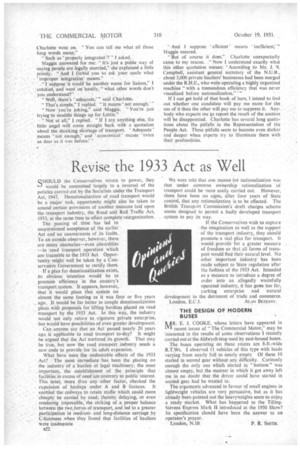Revise the 1933 Act as Well QI-IOULD the Conservatives return
Page 56

If you've noticed an error in this article please click here to report it so we can fix it.
to power, they " would be committed largely to a reversal of the policies carried out by the Socialists under the Transport Act, 1947. Denationalization of road transport would be a major task, opportunity might also be taken to amend certain provisions of another measure laid upon the transport industry, the Road and Rail Traffic Act, 1933, at the same time to effect complete. reorganization.
The passing of time has led to unquestioned acceptance of the earlier Act and an unawareness of its faults. To an outside observer, however, there are many anomalies—even absurdities —in road transport 'operation which are traceable to the 1933 Act. Opportunity might well be taken by a Conservative Government to rectify them.
If a plan for denationalization exists, its obvious intention would be to promote efficiency in the country's . transport system. It appears, however,. that it would place that system on almost the same footing as it was four or five years ., ago. It would be -far better to 'couple denationalizatiOn plans with proposals for lifting burdens placed on road transport by the 1933 Act. In this way, the industry would not 'only return to vigorous, private enterprise, but would have possibilities of even greater development.
Can anyone say that an Act passed nearly 20 years ago is applicable to road transport to-day? It might be argued that the Act nurtured its growth. That may be true, .hut now the road. transport industry needs a new code to provide for 'its adult expansion.
What have seen the undesirable effects of the 1933 Act? The most immediate has been the placing on the industry of a burden of legal machinery; the most important, the establishment of the principle that • facilities in excess of need are contrary to public interest. This tenet, more than any other factor, checked the expansion of haulage, under A and B licences. It
• enabled the railways to retain traffic which could more cheaply' be carried by road, thereby delaying, or even rendering impossible, the striking of a proper balance between the two, forms of transport, and led to a greater participation in mediumand long-distance carriage by C-licensees when they 'found that facilities of haulierS were inadequate.
1322 We were told that one reason for nationalization was that under common ownership rationalization Of transport could be more easily carried out. However, there have been no signs, after four years of State control, that any rationalization is to be effected. The British Transport Commission's draft charges scheme seems designed to permit a badly developed transport system to pay its way.
If the Conservatives wish to capture the imagination as well as the support of the transport industry, they should promote a real plan for transport. It would provide for a greater measure , of freedom so that all forms of transport would find their natural level. No. other important industry has been made subject to State regulation after the fashion of the 1933 Act. Intended as a measure to introduce a degree of order into an allegedly wastefully operated industry, it has gorie_too far, curbing enterprise and natural development to the detriment of trade and commerce.
London, E.C.1. • ALAN BEZZANT.
THE DESIGN OF MODERN BUSES
lkfiR. E. I. COOKE, whose letters have appeared in LY I recent issues of "The Commercial Motor," may be interested in the results of some observations I recently carried out at the Aldwych stop used by east-bound buses.
The buses operating on these .routes are 8-ft.-wide R.T.Ws. I observed 11 vehicles of this type with loads varying from nearly full to nearly empty Of these 10 started in second gear without any 'difficulty. Curiously enough the only one which started in "bottom" was almost empty, but the manner in which it got away left me in no doubt that the driver could have started in
second gear had he wanted to. •
• The arguments advanced in favour of small engines in lightweight vehicles are very persuasive, but as it has already been .pointed out the heavyw,eights seem to enjoy a ready market. What has happened to the TillingStevens Express Mark II introduced at the 1950 Show? Its specification should have been the answer to an operator's prayer.• London, N.10: P. It; Sitill14:




































































































